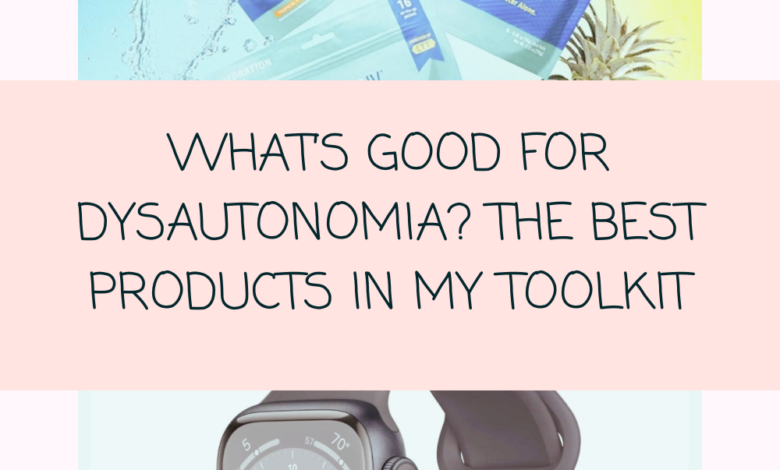What’s Good for Dysautonomia? The Best Products in My Toolkit

Living with dysautonomia—a disorder of the autonomic nervous system—often means navigating a complex array of symptoms that significatly impact daily life. From managing dizziness and fatigue to addresign digestive issues and temperature regulation, finding the right tools and products can make a world of difference. If you’re asking yourself “what’s good for dysautonomia?” let’s take a peek into my personal toolkit!
*This post may include affiliate or referral links. At no extra cost to you (and with a special reader discount, in some cases!), I’ll receive a small commission or other rewards to help support An Ideal Life. As an Amazon Associate, I earn from qualifying purchases*
The information in this blog post is provided for educational and informational purposes only and should not be construed as medical advice. The content is not intended to be a substitute for professional medical advice, diagnosis, or treatment. Always seek the advice of your physician or other qualified healthcare provider with any questions you may have regarding a medical condition. Never disregard professional medical advice or delay seeking it because of something you have read online. The author of this post is not a licensed medical professional and does not assume any liability for any actions taken based on the information contained in this post.
What Formal Treatments and Medications are Good for Dysautonomia?
While having a well-rounded self-care toolkit can be a great help in managing dysautoomia, it’s just as important to prioritize any formal medical treatments or medications. Always consult with your healthcare team to determinethe best course of actionfor your sprecific condition!
Medication for Dysautonomia
- Fludrocortison (Florinef): This medication helps to increase blood volume, wihich can reduce dizziness and improve blood pressure.
- Midodrine (ProAmatien): Midodrine is used to treat lw blood pressure (hypotension) by constricting blood vessels.
- Beta-Blockers: Medications like propranolol can help manage symptoms such as rapid heart rate (tachycardia).
- Ivabradine (Corlanor): Ivabradine can help manage symptoms of Postural Orthostaatuc Tachycardia Syndrome (POTS) or Inappropriate Sinus Tachcardia (IST) by reducing heart rate.
- Pyridostigmine (Mestinon): This medicaiton can help improve muscle strength and autonomic function .
- Selective Serotonin Reuptake Inhibitors (SSRIs) and Serotonin-Norepinephrine Reuptake Inhibitors (SNRIs): These can help manage symptoms of anxiety and depression, which may accompany dysautonomia.
- Intravenous Saline: For severe cases, intravenous saline infusions can help increase blood volume and stabilize blood pressure.

Are you looking for an accessible primary care physician? Try PlushCare! This telehealth platform lets you see a qualified GP from home, getting you the care you need when you need it. Use our referral link to get your first three months’ membership free.
Electrolytes
First and foremost, electrolytes are key! Staying hydrated is a top priority for anyone with dysautonomia, and these supplements can help maintain fluid balance and prevent dehydration by replenishing lost salts and minerals. Liquid IV creates my all-time favorite electrolyte powder, and I’ve worked SaltStick’s electrolyte capsules into my routine to help keep things stable.
Water Bottle or Tumbler
Speaking of hydration…whether you opt for the fan-favorite Stanley tumbler, a Hydro Flask, or another brand, having a dediciated water bottle or cup can be the difference between adequate hydration and…being not-so-hydrated.
Read some of our favorite ways to drink more water!
Compression Garments
Compression garments such as socks and leggings are absolutely indispensable in my daily routine. These items are good for dysautonomia and other conditions in that they help improve blood circulation, reduce swelling, and prevent blood from pooling in the legs. I love Vim & Vigr compression socks and recently added a few pairs from Wellow to my collection, too. For compression leggings that are both fashionable and functional, I swear by my Fabletics finds!
Cooling Tools
Temperature regulation is a particular challenge, especially in hot weather, so cooling tools such as portable fans are specially good for dysautonomia! I’ve purchased two different rechargeable mini fans from Temu, as well as a miniature fan that plugs right into the lightning port of my cellphone. By keeping one or more of these in my bag, I’m always prepared with a bit of cool air, even when I have to leave the safety of air conditioning!
I also love Miss A’s instant cooling patches and have my eye on the more high-tech Embr Wave device!
Browse more chronic illness products on my wish list!
Apple Watch
Monitoring my heart rate is crucial for managing dysautonomia, especially with my persistent tachycardia! My Apple Watch makes it easy to kep track of any irregularities and adjust my activities accordingly. This real-time feedback allows me to avoid overexertion and stay within safe limits.
I’ve seen some folks mention that devices like an Apple Watch caused them to hyperfocus on their heart rate, leading to additional anxiety but, in my experience, I’ve found it to have the opposite effect. Paired with a portable watch charger to make sure it’s always ready to go, I always have something keeping track in the background. So, when I feel like something might be a litlte off, I don’t have to panic and stop to track my BPM—I know that my watch is already on the case!
Medical ID Bracelet
Wth a long history of syncope, I’m perpetually terrified that I’m going to pass out in public on the rare occasions I’m not with a friend or family member…and that a well-meaning bystander will call an ambulance, leaving me with a bill I definitely can’t fit into my budget. My top priority when ordering my Road ID bracelet was having a constant note that my fainting is normal and an ambulance isn’t necessary. It won’t always be noticed, of course, but it offers a little more reassurance as I go about my day-to-day life with dysautonomia.
Digestive Relief
Digestive issues are a common symptom of dysautonomia (and several of my other chronic conditions!) so a few key products are especially helpful. My nausea relief kit is so good for dysautonomia! I’ve even found that alcohol pads help not just nausea but presyncope symptoms, too!
Mobility Aids
When dealing with symptoms like dizziness and lightheadedness, a walking cane or other mobility aid is essential. As my chronic pain worsens, though, I’m finding that a conventional cane can lead to other symptoms worsening! With that in mind, I have a few other mobility aids on my wish list that would be good for dysautonomia, too.
Essential Oils
Aromatherapy has a slew of benefits, so an essential oil diffuser might be good for dysautonomia (just be sure to look into essential oil safety if you live with pets!). I also love the VertigoEase roller from Basic Vigor, the company behind all my favorite Migrastil products. Vertigo and syncope may not be interchangeable in a technical sense, but I find these scents helpful all the same!
Blood Pressure Monitor
Keeping track of your blood pressure is crucial, too, especially if you deal with additional cardiovascular concerns such as hypertension, like I do. A portable blood pressure monitor allows you to regularly check your readings and adjust your activities or treatment methods as needed!
Emergency Info Card
Carrying emergency information cards with details about your condition, your medications, and emergency contact details helps ensure that first responders have immediate access to critical information if you’re unable to communicate. I keep a set of CureUp cards in a lanyard, including info on my various conditions, my allergies and medications, and my emergency contact details.
Pill Case
While none of my current prescription medications are specifically for this condition, there’s no question that an on-the-go pill case is good for dysautonomia and other chronic conditions. I have an assortment of these small three-compartment pill boxes (if you’re on more of a budget, Temu has plenty of cute ones, too!).
Snacks
Snacks are absolutely critical for spoonies of all kinds, and salty snacks tend to be particularly good for spoonies! I try to keep a few on-the-go packs of snacks such as pretzels, potato chips, crackers, and nuts on hand for whenever the need might strike.
Awareness Wear
Looking to advocate for and spread awareness of dysautonomia? Look no further than awareness apparel and accessories from brands like our Spoonie Style Shop! Whether you go for a subtle teal ribbon design or something more detailed, there are plenty of designs that are good for dysautonomia patients.
Living with dysautonomia can be challenging, but having the right products in your toolkit can make a significant diference. From compression garments to electrolyte supplements, each item plays a vital role in managing symptoms and improving quality of life. While everyone’s experience is unique, I hope these recommendations offer some support! Of course, remembr it’s always essential to consult with a healthcare professional before incoroprating new products into your routine. What works for one person may not work for another, so finding the right balance is key!
Source link



